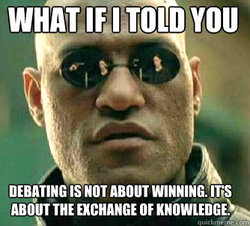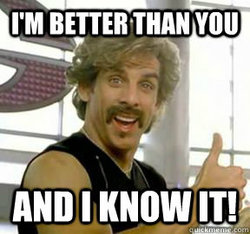 People get uncomfortable when called out on their stuff. I know I do, anyway. Sometimes, an individual gets called out, and sometimes it’s a group or culture. For example, I often post intense political or scientific ideas on Facebook, such as alternative views on reality that are not currently accepted by the mainstream. Most “Facebook debates” are framed into a dichotomy. Someone is either on the popular side of the argument or the unpopular side. Nevertheless, as much as we might try, it can be nearly impossible to find truth between only two choices. To take the evolution versus creation debate, I believe there is evolution, but there is also an unseen creative consciousness beyond entropy that shapes it. Since this theory doesn’t fit into the black/white dichotomy between Darwinian evolution and biblical creation, people get uncomfortable. Personal Growth is an Inside Job To take another zinger, we need look no further than the events of 9/11, whose assumed facts imply that a foreign boogeyman called the shots from a cave in Afghanistan instead of domestic politicians with an agenda from the pentagon. This assumption has shaped our culture in so many ways over the last decade that accepting an alternative theory would in turn question the nature of our reality to the point where major cultural changes would be needed to integrate it. Major changes to our reality make people uncomfortable, as does considering that we might be our own biggest enemy. Most would agree that money and power motivate the average human more than religious beliefs, but when a terrorist plot unfolds, it makes people uncomfortable to think that such a plot could be motivated by the money or power that flows as a consequence of the event. Instead, it’s more comfortable to believe that such an event is motivated by insanity or religion (a religion, of course, that’s not our own). People get uncomfortable when you implicate authority figures instead of scapegoats.  If you asked someone if they supported dumping the industrial waste of fertilizer and aluminum factories into our drinking water, he or she would likely be against it. However, if the proposal came from a dentist, city councilman, or some other authority figure (like a person who brandishes the word “science” in their name), then people would find it easier to disregard common sense for a manufactured consensus. Contradicting authority makes people uncomfortable. Questioning the fabric of our reality makes people uncomfortable. Being blunt makes people uncomfortable. Authority and Authenticity  Perceived authority is often essential for people to have faith in information they are given. I have a guided meditation project, and I sometimes get called out for sharing methods of introspection and relaxation when I don’t live every moment of my life in complete peace and bliss, meditating in joy for several hours every single day. People get uncomfortable when someone who proclaims the benefits of looking within in peace can also spend time getting absorbed in the world without that is not in peace. Authoritative yogis should only talk about the positive, and certainly, the only type of societal remediation that a Yogi can contribute is to meditate and only look within himself instead of calling attention to wounds on the outside. When a meditation practitioner questions authority and his outer reality, people get uncomfortable. Like anyone, I’ve had my own personal issues. While my stuff is small potatoes – being sarcastic, having an occasional unhealthy habit, being overly perfectionist, getting caught up in conspiracy mongering, being sometimes lazy, socially awkward, or having the occasional argument with someone about money, it’s not an insurmountable mountain to climb. I’ve never hit a woman; I don’t lie to people; I am generous with food; and I always honestly wish everyone the best with unconditional love, reveling in the success of others without resentment or jealousy (much). I’m still not perfect, but my practice has helped me grow and realize some of my issues. If it worked for me, it can work for others – whether I’ve become a perfect person or not. It’s not just about the messenger; it’s about the message itself. One does not need to be a perfect specimen to gain the credibility to share the benefits of meditation (or any other healthy practice valuable in and of itself), but rather, it is enough that there has been progress moving towards goals as a result of the practice. Delegating Our Beliefs to Authority  Nevertheless, if the messenger’s perceived authority is questioned, then the message may not be utilized. As such, instead of being honest with oneself that meditation is a practice to work on awareness, accept and address our faults, and improve our life, some feel that such advice is only valid if given by a model authority figure. Sometimes, people can’t find truth in a concept on its own merits but must have it told by an outside authority perceived as a perfect and infallible person – a guru. When we only accept information based on the authority of who delivered it, then we are no longer processing the information itself, but only the reputation of the messenger. To keep the illusion that such an authority is a perfect human, the guru must live behind a façade to appear 100% coherent with the preconceived picture of a perfect life of nonstop bliss, absent from conflict. For example, they might hide things about their past or suppress transient feelings to keep authority. Does this sound authentic to you? It doesn’t to me, but it’s easier for someone to tune in to a consensus manufactured by an authoritative guru than to stop, feel, question, be willing to change opinions or be wrong or be vulnerable once in a while, accept that we are not perfect, and grow. Some people need a guru because they fear making decisions for themselves, but we all have an inner guru that is just as reputable when the external guru's façade is removed. Be Your Own Guru  Don't forget government and science Don't forget government and science Growth through experience makes people uncomfortable, but authenticity and integrity come from an honest effort and honest belief followed by diligent action to make good on our promises. In the yogasutras, this is called “tapas.” It does not mean that you are a model citizen who succeeds on every single goal you set, only that you make progress and adapt. Often, we learn better through failure. The solution to being our authentic selves is to address nagging feelings inside of us as they arise and accepting them as real but transient. These feelings tell us to question our currently accepted outward reality and make the appropriate changes to find harmony between our current reality and our current self. The only truth that we can experience as an individual with a separate ego is our own understanding. To find our own truth we must, at times, become our own authority figure. In doing so, we can not be hindered to express ourselves because it makes us or someone else feel uncomfortable once in a while. If we wanted to always be comfortable, then why bother coming into human form? It’s probably more comfortable to hang out in the spirit realm or in another galaxy where people aren’t fighting all the time, but we came here to evolve. The only way to evolve as a person and as a species is to continue to question our accepted reality and our accepted truth, as painful as the process can be. In doing so, the evolution of our reality begins to unfold the evolution of our self.
0 Comments
Your comment will be posted after it is approved.
Leave a Reply. |
RussCategories
All
Archives
October 2022
Copyright (c) 2015 Russell Eric Dobda
|
 RSS Feed
RSS Feed
